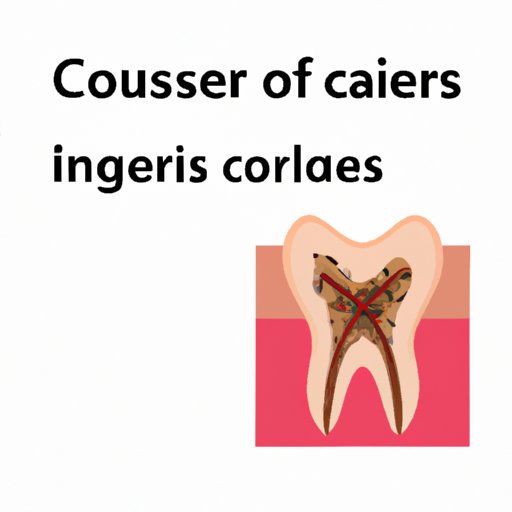I. Introduction
Canker sores, also known as aphthous ulcers, are painful oral lesions that can cause discomfort and annoyance. These small, shallow ulcers usually occur on the inside of the lips, cheeks, gums, and tongue, and while they are not contagious or dangerous, they can make speaking, eating, and drinking a painful experience. In this article, we will explain why canker sores hurt and how to manage their pain effectively.
II. The Science Behind Canker Sores: Understanding the Painful Oral Lesions
Canker sores are typically small, round, or oval-shaped lesions with a white or yellow center and a red border. Although they can vary in size, most canker sores are less than a centimeter wide and usually go away within a week or two. Canker sores typically do not leave scars once they heal.
The anatomy of the mouth can explain why canker sores hurt. The mouth is covered with a thin layer of skin called mucosa that is rich in nerve endings and blood vessels, which can make canker sore pain acute and sensitive. Canker sores are caused when the mucosal lining of the mouth is injured, irritated, or inflamed, and the body’s immune system sends white blood cells to repair the damage. Thus, the pain associated with canker sores is a result of the nerve endings in the area sending a signal to the brain, indicating that the tissue is damaged or swollen.
III. Unveiling the Myths: Debunking Misconceptions About Canker Sores and Their Pain
There are several misconceptions surrounding canker sores and their pain that can lead to confusion. One common myth is that canker sores are contagious, but they are not. Canker sores are not caused by a virus or bacteria, but rather result from a variety of factors. Another myth is that canker sores are caused by poor oral hygiene, which is untrue. While good oral hygiene may help prevent canker sores by fostering healthy oral tissue, canker sores can happen to anyone regardless of oral hygiene habits.
Another misconception is that canker sores can be cured with a single medication or treatment, but canker sores are a recurring condition with no single cure. While some treatments can speed up the healing process and provide relief, canker sores can reoccur over time.

IV. Exploring the Triggers: What Causes Canker Sores and Why They Hurt
Several factors can trigger canker sores, and understanding these triggers can help individuals prevent them from happening. Stress, hormonal changes, certain foods, and injury to the mouth tissues are common triggers for canker sores. Additionally, some individuals may be genetically predisposed to canker sores; a family history of canker sores may increase the likelihood of developing them.
When canker sores develop, they can cause pain and sensitivity in the surrounding tissues. The inflammation and nerve sensitivity that come with canker sores can worsen if the ulcer is exposed to certain foods or drinks that can irritate the sore. Foods and drinks high in acidic content, such as sodas, citrus fruits, or spicy food, can make canker sores hurt more.
V. The Emotional Toll of Canker Sores: Coping with the Discomfort and Pain
Canker sores can cause significant discomfort and negatively impact a person’s quality of life. They can interfere with eating, drinking, speaking, and even smiling, leading to anxiety, stress, and feelings of embarrassment or frustration. The pain and discomfort associated with canker sores can also disrupt sleep and impact mental health.
Managing the emotional toll of canker sores can involve seeking emotional support from healthcare professionals or loved ones, practicing stress-reducing activities like yoga or meditation, staying hydrated, getting adequate rest, and eating nourishing foods that are gentle on the mouth and gut. Avoiding triggers, staying away from irritants like tobacco or alcohol, and practicing good oral hygiene can also help reduce the frequency of canker sores.
VI. Finding Relief: Home Remedies and Treatments for Canker Sore Pain
Various remedies and treatments can help relieve the pain and discomfort of canker sores. Over-the-counter medications like numbing gels or mouth rinses that contain Benzocaine or Lidocaine can help numb the ulcers and reduce pain. Mild analgesics like ibuprofen or aspirin can help reduce inflammation and pain associated with canker sores. Additionally, natural remedies like aloe vera gel, coconut oil, or tea tree oil can help soothe the ulcers.
Individuals who experience frequent or severe canker sores may benefit from prescription treatments like corticosteroids or antimicrobial mouthwash. However, it is essential to consult a healthcare professional regarding the treatment of chronic canker sores, as some conditions may require more extensive medical management.
VII. When to Seek Medical Attention: Understanding If and When Canker Sores Require Professional Help
In some cases, canker sores may require medical attention. Individuals experiencing moderate to severe canker sore pain, a fever, inflamed lymph nodes, or sores that do not heal after three weeks should consult a healthcare professional. Additionally, individuals whose canker sores have spread to other areas of the body and those with a history of the condition should seek a medical consultation to rule out underlying health conditions.
Healthcare professionals may recommend treatment options like prescription medications or blood tests to diagnose underlying conditions that may be causing canker sores. In some cases, medical professionals may recommend lifestyle changes to prevent future outbreaks of canker sores, including improving oral hygiene, reducing stress, or avoiding certain foods.
VIII. Conclusion
In summary, canker sores are common, painful oral ulcers that can cause discomfort and disruption to daily life. Understanding canker sore pain and its triggers can help individuals prevent and manage their canker sore outbreaks effectively. While canker sores can cause emotional distress, managing the pain and discomfort associated with them is possible. By staying informed and seeking medical attention as needed, individuals can find relief from canker sore pain and lead healthy, happy lives.
